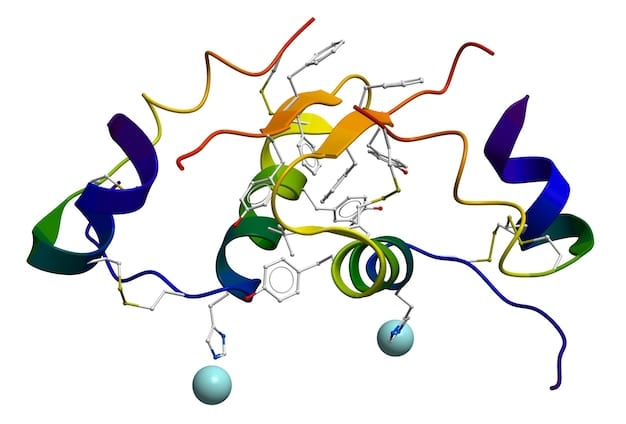Genetics and Obesity: Your Comprehensive Guide

Understanding how genetics influences obesity is crucial, as individual predispositions significantly interact with environmental factors to determine a person’s weight and health outcomes.
For many, the struggle with weight can feel like a labyrinth, often with frustrating dead ends despite diligent efforts. While diet and exercise are undeniably foundational, a growing body of evidence points to another powerful, often overlooked player: our genes. Exploring The Role of Genetics in Obesity: What You Need to Know offers a fresh perspective, moving beyond simplistic narratives to embrace the complex interplay between our inherited makeup and lifestyle choices. This journey into genetic predisposition aims not to diminish personal responsibility but to empower understanding.
The Complex Interplay: Genes and Environment in Obesity
Obesity, a global health challenge, is rarely the result of a single cause. Instead, it emerges from a multifaceted interaction between an individual’s genetic blueprint and their surrounding environment. While genetic predispositions can significantly influence how our bodies store fat, metabolize food, and regulate appetite, these influences are almost always modulated by lifestyle factors.
Think of it as seeds and soil. Our genes are the seeds, determining the potential for growth and characteristics. The environment—our diet, physical activity levels, stress, sleep patterns, and even early life exposures—is the soil. A “good” seed planted in poor soil may not thrive, just as a “less resilient” seed can flourish in rich soil. Understanding this dynamic interplay is key to effectively addressing and managing obesity risk.
Genetic Predisposition: More Than Just “Fat Genes”
The concept of “fat genes” is a simplification. Modern genetics reveals that hundreds of genes, each with a small effect, contribute to obesity susceptibility. These genes influence various biological pathways:
- Appetite Regulation: Genes can affect how hungry we feel, how quickly we feel full, and our cravings for certain foods.
- Metabolism: Some genes influence the rate at which our bodies burn calories and how efficiently we convert food into energy or store it as fat.
- Fat Distribution: Genetic factors play a role in where our bodies tend to store fat, whether it’s predominantly around the abdomen (visceral fat) or in other areas.
- Energy Expenditure: Genes can influence our basal metabolic rate (BMR), the number of calories we burn at rest.
While an individual might inherit a genetic profile that makes them more susceptible to weight gain, it does not mean obesity is inevitable. These genetic “predispositions” are potentials, not predetermined outcomes. Environmental factors, particularly diet and physical activity, act as powerful modifiers, capable of either amplifying or mitigating genetic influences.
For instance, an individual with a genetic tendency towards efficient fat storage might gain weight more easily in an environment rich in processed foods and sedentary lifestyles. However, the same individual, if they adopt a balanced diet and regular physical activity, might maintain a healthy weight. This nuanced understanding emphasizes that genetics provides a framework, but lifestyle fills in the details.
The evolving field of nutrigenomics, which studies the interaction between genes and nutrition, is beginning to shed light on how specific dietary components might interact with an individual’s genetic makeup. This could pave the way for more personalized dietary recommendations in the future, moving beyond a “one-size-fits-all” approach to weight management.
In essence, our genetic blueprint is a hand of cards we’re dealt. While some hands might be more challenging, the way we play those cards—through our lifestyle choices—ultimately determines the outcome. Acknowledging the genetic component helps to remove blame and fosters a more empathetic approach to weight management, focusing on personalized strategies rather than universal prescriptions.
Key Genes Implicated in Obesity Development
While the full genetic landscape of obesity is still being mapped, significant progress has been made in identifying specific genes that play a notable role. It’s crucial to understand that no single gene is solely responsible for obesity; rather, it’s a complex symphony of many genes interacting with environmental factors. Research continues to uncover novel associations, but several genes have emerged as prominent players in recent years.
One of the most extensively studied genes associated with obesity is the FTO (Fat Mass and Obesity-associated) gene. Variations in the FTO gene have consistently been linked to increased body mass index (BMI) and a higher risk of obesity across various populations. Individuals carrying certain variations of the FTO gene tend to have a higher average weight and a greater predisposition to storing fat. Its influence is thought to stem from its role in appetite regulation and energy expenditure, although the exact mechanisms are still under investigation. For instance, some research suggests that FTO variations might make individuals feel less full after eating or crave higher-calorie foods, leading to increased caloric intake.
Beyond FTO: Other Significant Genetic Contributors
- MC4R (Melanocortin 4 Receptor) gene: This gene plays a critical role in regulating appetite and energy balance in the brain. Mutations in the MC4R gene are a relatively common cause of severe early-onset obesity. Individuals with dysfunctional MC4R receptors often experience extreme hunger, leading to excessive food intake from a young age.
- BDNF (Brain-Derived Neurotrophic Factor) gene: BDNF is involved in neuronal survival and growth, and also plays a role in appetite regulation and energy balance. Variants in the BDNF gene have been linked to increased food intake and a higher risk of obesity. It’s thought to directly influence satiety signals within the brain.
- LEP (Leptin) and LEPR (Leptin Receptor) genes: Leptin is a hormone produced by fat cells that signals satiety to the brain, helping to regulate energy balance. Defects in the leptin gene or its receptor gene can lead to a condition called congenital leptin deficiency, characterized by severe obesity due to an inability to feel full. While rare, these single-gene disorders highlight the powerful influence specific genes can have on weight regulation.
Understanding these genetic influences is not about assigning blame but about developing more targeted interventions. For example, knowing that someone has a variant in the FTO gene might lead to a greater emphasis on portion control and mindful eating strategies. Similarly, research into MC4R and leptin pathways could lead to novel pharmaceutical interventions for specific genetic forms of obesity.
The field of genetics in obesity is dynamic, with new discoveries constantly refining our understanding. While individual genes have identifiable effects, remember that obesity is polygenic, meaning many genes contribute, each with a small effect. It’s the cumulative impact of these genetic variants, combined with environmental exposure, that shapes an individual’s susceptibility to weight gain. This complexity underscores the need for personalized approaches to obesity prevention and treatment, moving away from generic advice and towards strategies tailored to an individual’s unique biological and social context.
Monogenic vs. Polygenic Obesity: Understanding the Differences
When discussing the genetic basis of obesity, it’s essential to distinguish between two primary categories: monogenic obesity and polygenic obesity. This distinction helps clarify the varying degrees of genetic influence and potential paths for intervention.
Monogenic obesity is a rare form of obesity caused by a mutation in a single gene. These genetic variants typically lead to severe, early-onset obesity, often in childhood. Because only one gene is responsible, the effect is usually profound and clearly identifiable. The classic examples involve genes crucial for the leptin-melanocortin pathway, which is central to appetite regulation. For instance, individuals with mutations in the leptin gene (LEP) or its receptor (LEPR) cannot properly signal satiety to their brain, leading to insatiable hunger and rapid weight gain from infancy.
Key Characteristics of Monogenic Obesity:
- Single Gene Cause: Caused by a significant mutation in one specific gene.
- Severe and Early Onset: Typically manifests as extreme obesity in very young children.
- Rare: Accounts for a very small percentage of all obesity cases (less than 5%).
- Clear Genetic Link: Often follows a clear Mendelian inheritance pattern within families.
- Potential for Targeted Treatments: In some cases, like leptin deficiency, hormonal replacement therapy can be highly effective.
In contrast, polygenic obesity represents the vast majority of obesity cases. This form of obesity is much more common and is influenced by the combined effects of multiple genes, each contributing a small, additive risk. These are the subtle genetic predispositions that, when interacting with environmental factors like diet, physical activity, and lifestyle, determine an individual’s overall susceptibility to weight gain. Think of it as a cumulative genetic “risk score,” where each genetic variant adds a tiny bit to the overall likelihood of developing obesity.

Key Characteristics of Polygenic Obesity:
- Multiple Gene Involvement: Influenced by hundreds of common genetic variants, each with a small effect.
- Varied Onset and Severity: Can develop at any age and its severity is highly dependent on environmental interactions.
- Common: Accounts for over 95% of obesity cases.
- Complex Environmental Interaction: Genetic predisposition is strongly modulated by lifestyle choices.
- Prevention and Management Focus: Lifestyle interventions (diet, exercise) are the primary and most effective management strategies, often supported by behavioral and medical therapies.
Understanding this distinction is vital for both research and clinical practice. While monogenic obesity offers clear genetic targets for diagnosis and potential precision therapies, polygenic obesity underscores the need for lifestyle interventions as the cornerstone of prevention and management. It highlights that even with a genetic predisposition, individuals have agency through their choices. Researchers are actively developing polygenic risk scores that can help identify individuals at higher genetic risk for obesity, potentially allowing for earlier, more intensive lifestyle interventions to counteract these predispositions. This emphasizes a personalized prevention approach, rather than a one-size-fits-all model.
Genetic Testing for Obesity: What Are the Implications?
The rapid advancements in genomics have brought genetic testing into the mainstream, raising questions about its utility in understanding and managing obesity. While genetic tests can reveal certain predispositions, their practical implications for the average individual grappling with obesity are complex and still evolving.
For rare cases of monogenic obesity, genetic testing can be profoundly impactful. Identifying a specific single-gene mutation (e.g., in LEP or MC4R) can lead to a definitive diagnosis, provide clarity for affected families, and even guide specific, highly effective treatments, such as leptin replacement therapy for congenital leptin deficiency. In these instances, genetic testing moves beyond prediction to direct medical management.
However, for the vast majority of common, polygenic obesity, the role of genetic testing is far less clear-cut. Commercial genetic tests often claim to assess an individual’s “genetic risk” for obesity by analyzing multiple common genetic variants. These tests typically assign a polygenic risk score (PRS) based on hundreds of genetic markers. A higher PRS indicates a greater genetic predisposition. However, it’s crucial to understand what these scores truly imply.
Implications and Limitations of Genetic Testing for Polygenic Obesity:
- Not Diagnostic: A high polygenic risk score does not mean an individual will definitely become obese. It simply indicates a higher statistical likelihood compared to those with lower scores, given common environmental exposures.
- Limited Predictive Power: While PRSs explain a portion of the heritability of obesity, they do not account for all of it, and environmental factors still play a dominant role in determining actual weight. Lifestyle choices can significantly override genetic predispositions.
- Actionability: For polygenic obesity, the current recommendation for managing higher genetic risk is generally the same as for anyone seeking to prevent or manage obesity: adopt healthy lifestyle habits (balanced diet, regular physical activity, adequate sleep, stress management). There are rarely specific, unique interventions tailored to an individual’s polygenic risk score that are not widely applicable.
- Ethical Considerations: Genetic test results can sometimes lead to anxiety, fatalism, or unhealthy behaviors if misinterpreted. Counseling from a genetic professional is often essential to understand the nuances of the results.
- Nutrigenomics in its Infancy: While the promise of personalized nutrition based on genetic makeup (nutrigenomics) is exciting, it’s still largely a research area. Most current recommendations based on genetic tests for diet or exercise effectiveness lack robust scientific backing for widespread clinical application.
Currently, for most individuals, the most actionable insights for obesity management still come from a thorough assessment of lifestyle, medical history, and behavioral patterns, rather than a genetic risk score alone. While genetic testing can offer an interesting glimpse into our predispositions, it should be viewed as one piece of a much larger puzzle, not the sole determinant of destiny.
The implications of genetic testing for obesity vary greatly depending on the specific type of obesity and the context. For rare, severe forms, it can be a powerful diagnostic tool with direct therapeutic possibilities. For common, polygenic obesity, its role is more about understanding predisposition rather than dictating specific management strategies that differ significantly from general public health recommendations. As science progresses, the utility of such tests may expand, but for now, lifestyle choices remain the most potent tool in managing weight, regardless of one’s genetic blueprint.
Epigenetics and Obesity: Beyond the DNA Sequence
While genetics refers to the inherited DNA sequence, epigenetics explores how genes are expressed—turned on or off—without altering the underlying DNA code. This dynamic field offers a fascinating layer of complexity to our understanding of obesity, suggesting that environmental factors can directly influence gene activity in ways that impact metabolic health and fat storage.
Epigenetic modifications are like switches or dimmer knobs on our genes. They don’t change the gene itself, but they dictate whether that gene is highly active, subtly active, or completely silent. The two primary types of epigenetic modifications are DNA methylation and histone modification. These “marks” can be influenced by various external factors throughout life, starting even before birth.
The critical aspect of epigenetics in obesity is that these modifications can be influenced by environmental factors such as diet, exercise, stress, exposure to toxins, and even parental health and nutrition. For example, a mother’s diet during pregnancy can epigenetically program her child’s metabolism, increasing or decreasing their risk of obesity later in life. This concept is often referred to as “developmental origins of health and disease” (DOHaD).
How Epigenetics Influences Obesity Risk:
- Maternal Nutrition: Poor maternal nutrition or over-nutrition during pregnancy can alter the epigenetic marks on genes involved in fat metabolism and appetite regulation in the offspring, predisposing them to obesity.
- Dietary Components: Specific nutrients (e.g., folate, B vitamins) can act as “epigenetic modulators,” directly influencing DNA methylation patterns. A diet rich in certain “epigenetic nutrients” might promote healthier gene expression related to weight.
- Physical Activity: Exercise has been shown to induce beneficial epigenetic changes in muscle and fat tissue, improving insulin sensitivity and metabolic function.
- Stress: Chronic stress can trigger epigenetic changes that favor fat accumulation and disrupt metabolic homeostasis.
- Early Life Events: Traumatic experiences or early-life stress can leave lasting epigenetic marks that contribute to obesity risk and metabolic dysfunction in adulthood.
The exciting implication of epigenetics is that while we cannot change our inherited DNA sequence, we might be able to modify our gene expression through lifestyle interventions. This offers a powerful message of hope and agency: even if predisposed genetically, conscious lifestyle choices can influence how those genes behave. Research into epigenetics provides a scientific basis for the enduring importance of a healthy diet, regular exercise, and stress management, not just for general well-being but for proactively shaping our metabolic destiny.
While the field is still young and complex, understanding epigenetics adds a crucial dimension to the discussion of obesity. It moves beyond a deterministic view of genetics, suggesting a dynamic interaction where lifestyle choices throughout life, and even parental behaviors, can sculpt our biological response to food and energy, offering new avenues for prevention and therapy. It emphasizes that our metabolic health is not just a matter of the genes we inherit, but also how those genes are “read” and acted upon throughout our lives.
Practical Implications: Leveraging Genetics for Personalized Obesity Management
While our genetic makeup cannot be changed, understanding its influence in obesity offers powerful insights for personalized prevention and management strategies. The goal is not to surrender to genetic fate but to leverage this knowledge to make more informed and targeted lifestyle choices.
First and foremost, genetic understanding can foster a more empathetic view of obesity. It moves away from simplistic narratives of willpower and personal failure, acknowledging that some individuals face an inherent biological uphill battle. This perspective can reduce self-blame and encourage a more sustainable approach to weight management, focusing on consistent, long-term healthy habits rather than short-term drastic measures.
Key Practical Considerations:
- Personalized Motivation: Knowing one’s genetic predispositions can be a strong motivator for adopting and maintaining healthy habits. If you know you have a higher genetic susceptibility to storing fat or feeling hungrier, it might empower you to be more vigilant with portion control or prioritize certain foods.
- Tailored Lifestyle Advice (Future Potential): While not fully realized for polygenic obesity yet, the future of nutrigenomics and personalized medicine aims to offer highly specific dietary and exercise recommendations. For example, an individual with certain genetic variants might benefit more from a low-carbohydrate diet, while another might thrive on a higher-protein approach. Currently, this is largely speculative for the general population but holds promise.
- Emphasis on Sustainable Habits: For individuals with a strong genetic predisposition, maintaining a healthy weight may require more consistent and perhaps more intensive effort than for others. This understanding can help set realistic expectations and encourage a focus on sustainable, long-term habits rather than quick fixes.
- Early Intervention: For those identified with significant genetic risk factors, particularly in cases of monogenic obesity, early diagnosis and intervention can be crucial. For polygenic risk, identifying at-risk individuals earlier could lead to more robust preventive education and support programs, especially in childhood and adolescence.
- Mental and Behavioral Health Support: Recognizing the biological drivers of obesity, including genetic ones, can prompt a more holistic approach that includes psychological support. Addressing underlying issues like stress, emotional eating, and body image can be just as important as diet and exercise, especially when facing strong biological predispositions.
Despite genetic predispositions, environmental factors remain profoundly impactful. Studies consistently show that a healthy lifestyle can largely counteract even a strong genetic risk for obesity. Regular physical activity, a balanced diet rich in whole foods, adequate sleep, and effective stress management are the cornerstones of weight management for everyone, regardless of their genetic profile. For those with a genetic predisposition, these healthy habits become even more critical, acting as powerful buffers against inherited tendencies.
The practical implication of genetics in obesity points towards a future of precision health, where an individual’s unique biological blueprint informs their health strategy. However, even without a detailed genetic analysis, the general principles of a healthy lifestyle remain universally beneficial. Understanding the genetic piece of the puzzle isn’t about finding an excuse; it’s about finding a more informed and perhaps more compassionate way to navigate the complex challenges of weight and health.

Beyond the Scale: Genetics, Health, and Well-being
The conversation around obesity often focuses heavily on weight and BMI, but genetics reminds us that health extends far beyond numbers on a scale. Our genes not only influence our susceptibility to weight gain but also how that weight — particularly excess body fat — impacts our overall health and risk for related diseases.
For example, some individuals may carry genetic variants that predispose them to store fat in metabolically unhealthy ways, such as visceral fat around organs, even if their overall weight gain isn’t extreme. This “metabolically unhealthy normal weight” phenomenon highlights that genetic predispositions can influence where fat is distributed and its metabolic consequences, regardless of BMI. Conversely, some individuals with higher BMIs may remain metabolically healthy for longer, perhaps due to protective genetic factors that influence their fat distribution or insulin sensitivity.
Genetics and Obesity-Related Complications:
- Type 2 Diabetes: Genetic variations can influence an individual’s susceptibility to insulin resistance and pancreatic beta-cell dysfunction, which are key drivers of type 2 diabetes. Obesity often exacerbates these genetic predispositions.
- Cardiovascular Disease: Genes play a role in regulating blood pressure, cholesterol levels, and inflammation, all of which are risk factors for heart disease. Obesity can amplify these genetic risks.
- Certain Cancers: Genetic predispositions to certain cancers can be influenced by obesity, where the interplay of inflammatory and hormonal factors stemming from excess fat tissue can accelerate disease progression.
- Non-alcoholic Fatty Liver Disease (NAFLD): Genetics influences an individual’s risk for developing NAFLD, with obesity being a major environmental trigger pushing susceptible individuals towards the disease.
Understanding these genetic nuances helps us appreciate that managing obesity is not solely about achieving a specific weight, but more broadly about improving metabolic health and reducing disease risk. For some, even modest weight loss can yield significant health benefits by improving metabolic markers, potentially “switching off” unfavorable gene expressions through epigenetic mechanisms. For others, maintaining a healthy lifestyle becomes paramount to mitigate genetic predispositions, even if significant weight loss is challenging.
The journey towards better health is deeply personal, and genetics provides another lens through which to understand our individual predispositions. It encourages a focus on behaviors we can control – our diet, physical activity, sleep, and stress management – which have profound positive impacts regardless of our genetic lottery. Embracing this holistic perspective fosters resilience, moving beyond the binary of “thin or obese” to a spectrum of health and well-being where every effort made towards a healthier lifestyle contributes meaningfully to our overall quality of life and disease prevention potential.
Ultimately, The Role of Genetics in Obesity: What You Need to Know isn’t about fatalism but about empowerment. It reminds us that while our genes may load the gun, our lifestyle pulls the trigger. By understanding these inherent predispositions, we are better equipped to navigate the complex landscape of health, making informed choices that support our well-being for the long run. The ongoing research in this area continues to unlock new pathways for personalized care, promising a future where our health strategies are as unique as our genetic code. It is a journey of continuous learning and adaptation, emphasizing that proactive health management is always within our reach.
| Key Point | Brief Description |
|---|---|
| 🧬 Genetic Predisposition | Genes influence appetite, metabolism, and fat storage, contributing to obesity susceptibility. |
| 🌱 Gene-Environment Interaction | Genetic risks are highly modifiable by lifestyle choices like diet and physical activity. |
| 🔬 Polygenic vs. Monogenic | Most obesity is polygenic (many genes, small effects), while rare severe cases are monogenic (single gene mutation). |
| 💡 Epigenetic Influence | Lifestyle factors can “switch” genes on/off without changing DNA, impacting metabolic health. |
Frequently Asked Questions About Genetics and Obesity
▼
No, genetics cannot fully explain weight gain. While genes play a significant role in predisposing individuals to obesity by influencing appetite, metabolism, and fat storage, environmental factors such as diet, physical activity, and lifestyle choices critically interact with these genetic predispositions. It’s a complex interplay where lifestyle often determines the ultimate outcome.
▼
There isn’t a single “fat gene” solely responsible for common obesity. Most cases are polygenic, meaning multiple genes, each with a small effect, contribute to susceptibility. Genes like FTO are widely studied for their association with BMI, but their influence is part of a larger genetic picture, significantly modulated by environmental factors.
▼
You cannot change your inherited DNA sequence, but you can influence how your genes are expressed through epigenetics. Lifestyle choices such as a healthy diet, regular exercise, adequate sleep, and stress management can positively impact gene expression, potentially mitigating genetic predispositions to weight gain and improving metabolic health.
▼
For rare monogenic forms of obesity, genetic testing can provide a definitive diagnosis and guide specific treatments. However, for common polygenic obesity, commercial genetic tests offer lifestyle recommendations that often mirror general healthy living advice. The predictive power for polygenic risk is limited, and lifestyle remains the most impactful factor.
▼
Not necessarily. While a family history of obesity indicates a higher genetic predisposition, it does not mean it’s inevitable. Genetics load the gun, but lifestyle pulls the trigger. By adopting and consistently maintaining healthy habits in diet and exercise, you can significantly counteract genetic influences and reduce your risk.
Conclusion
The journey to understanding obesity is complex, revealing a profound interplay between our inherited genetic blueprint and the diverse environmental factors we encounter daily. Far from being a matter of simple choices or willpower, obesity is a phenotype shaped by countless subtle biological mechanisms influenced by our genes, which dictate everything from our appetite signaling to how our bodies store and metabolize fat. However, recognizing the role of genetics is not a surrender to fate, but rather an empowering insight. It highlights that while we may inherit certain predispositions, our lifestyle choices—what we eat, how much we move, our sleep patterns, and how we manage stress—serve as powerful modifiers, capable of either accentuating or mitigating these genetic tendencies. The burgeoning fields of epigenetics and nutrigenomics further underscore this dynamic relationship, showing how our daily habits can literally influence which genes are turned on or off. Ultimately, a holistic and personalized approach, informed by the understanding of our unique genetic makeup but grounded in actionable lifestyle changes, remains the most effective strategy for managing weight and fostering long-term health and well-being.





